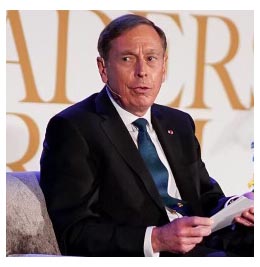By Tom Siebert
Retired four-star General David Petraeus, who led U.S. and coalition forces in the Afghanistan and Iraq wars, said recently that shifting military resources from one country to the other in 2003 led to failure on both fronts.
“We did not get the inputs right in Afghanistan,” said Petraeus, speaking at the recent Judson University World Leaders Forum at the Renaissance Schaumburg Convention Center. “The leadership of our country very quickly focused on Iraq. We devoted our attention to that. Then that went badly.”

The 37-year military veteran did not directly criticize then-president Donald J. Trump’s agreement in February 2020 to withdraw American troops from Afghanistan, nor president Joseph R. Biden’s decision to carry out the mission last August, which resulted in the collapse of the government and takeover by the Taliban terrorist militia.
“It was absolutely chaotic, and certainly not the way that those of us who served in that war would have wanted to see it end,” Petraeus told an audience of 500 veterans, active military personnel, Judson students, faculty, and community members.
The general lamented the loss of 13 U.S. troops and 169 Afghan civilians killed by an Islamic State suicide bomber at the Kabul airport August 26. But, he praised the American-led airlift that rescued 123,000 individuals from the war-ravaged country.
Petraeus admitted that the Afghan war was unwinnable, but would have preferred a “sustainable commitment” to the country to solidify U.S. gains in countering terrorism, building infrastructure, establishing press freedoms, and guaranteeing women’s rights.
“But at the end of the day, we ran out of strategic patience,” he concluded. “It was tragic.”
As for Iraq, the 69-year-old Petraeus defended the 2007 counterinsurgency, colloquially called “the surge,” in which he commanded the deployment of 20,000 additional soldiers to prop up government troops and quell terrorist attacks in the four-year-old war.
“Iraq was completely out of control,” he said. “Nation-building gets some criticism from time to time but it’s absolutely essential.”
According to the U.S. Dept. of Defense, 2,401 U.S. troops died in the 20-year war in Afghanistan, and 4,431 American service members were killed in the 18-year war in Iraq.
Human rights organizations estimate that more than 170,000 Afghans and 180,000 Iraqis died in the two wars.
Petraeus recalled his 14-month tenure as CIA director under president Barack Obama, and highlighted the capture and killing of 9/11 mastermind Osama Bin Laden in May 2011.
“I spent 10 years of my life chasing that guy,” Petraeus said of the al-Qaeda terrorist group leader who organized the hijackings of four U.S. airliners, two of which crashed into the World Trade Center in New York City, one into the Pentagon, and another into a field in Shanksville, Pa.. The coordinated attacks killed 2,977 Americans September 11, 2001.
The World Leaders Forum, which is celebrating its 10th anniversary, usually convenes at Judson’s Elgin campus, except when audience capacity exceeds its smaller Herrick Chapel. Television reporter Lisa Chavarria of NBC 5 in Chicago moderated the discussion. Petraeus was interviewed by conservative commentator Mark Vargas, a 2004 graduate of the University and president of the Forum.
Previous speakers at the Forum were former president George W. Bush; ex-Soviet Union leader Mikhail Gorbachev; former British prime minister Tony Blair; ex-Mexican president Felipe Calderón; Her Majesty Queen Noor of Jordan; author, attorney, and diplomat Caroline Kennedy; and jointly, former U.S. speaker of the House Newt Gingrich and ex-Vermont governor Howard Dean, who served as chair of the Democratic National Committee.
Over the past decade the Forum has heard from inspirational speakers such as evangelist Nick Vujicic, who was born without arms or legs; U.S. Olympic champion Mary Lou Retton; illusionist Jim Munroe; actor Terrence Howard; and Mark Cuban, host of ABC-TV’s “Shark Tank” and owner of the NBA’s Dallas Mavericks.
Proceeds from the World Leaders Forum provides funds for Judson’s leadership scholars program, innovative entrepreneurial activities, and ongoing operational purposes.
The University is a fully-accredited, private Christian institution representing the church at work in higher education. Nestled along the Fox River, 36 miles northwest of Chicago, Judson is home to more than 1,200 students from 43 states and more than 37 countries.
It offers degrees in more than 60 majors and minors for traditional, graduate, and adult students, ranking consistently among the best regional universities in the Midwest by U.S. News & World Report. Judson has been recognized as a “Christian College of Distinction.”

